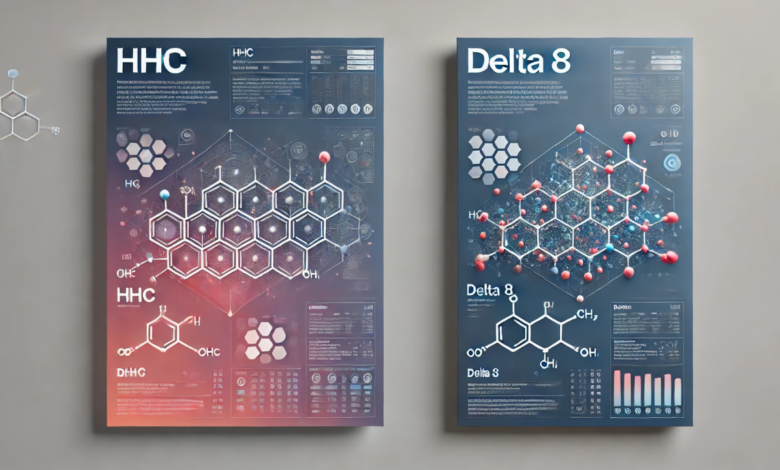HHC vs Delta 8: A Comprehensive Comparison of Two Popular Cannabinoids

The world of cannabinoids has exploded in recent years, with many options now available to those seeking alternative therapies or recreational experiences. hhc vs delta 8 Among the most discussed cannabinoids today are Hexahydrocannabinol (HHC) and Delta 8 THC. Although they share some similarities, they differ in ways that can influence your decision to try one over the other. This article will explore the two cannabinoids in-depth, helping you make an informed choice about which one is right for you.
1. What is HHC?
1.1 Chemical Composition and Structure
Hexahydrocannabinol (HHC) is a naturally occurring cannabinoid that has gained significant attention recently. It’s derived from tetrahydrocannabinol (THC), the compound primarily responsible for marijuana’s psychoactive effects. However, HHC has a slightly different molecular structure. The hydrogenation process used to create HHC involves adding hydrogen atoms to the THC molecule, which alters its chemical makeup. This process results in a more stable and less reactive form of THC, which makes HHC unique compared to other cannabinoids like Delta 8 and Delta 9 THC.
The alteration of the THC molecule means that HHC can produce effects that are somewhat similar to Delta 9 THC, but without some of the side effects. While research on HHC is still in its early stages, initial studies suggest that it has a less intense psychoactive effect compared to Delta 9 THC, which may make it more appealing to users seeking a more subtle experience.
1.2 How is HHC Made?
HHC is synthesized by hydrogenating THC, a process that converts the unstable double bonds in THC’s chemical structure into stable single bonds by adding hydrogen atoms. This transformation results in a cannabinoid that has a longer shelf life and doesn’t degrade as quickly when exposed to light or heat.
The process of making HHC can involve extracting THC from hemp or marijuana plants and subjecting it to hydrogenation in a lab setting. The end product is often produced in a form that is more potent and stable than its precursor, Delta 9 THC. While HHC can be found in trace amounts in nature, it’s typically manufactured in labs to meet the demand for this emerging cannabinoid.
1.3 Potential Benefits and Effects

HHC has been reported to have similar effects to Delta 9 THC, but with less potency. This makes it an attractive alternative for those who want the therapeutic benefits of THC without feeling overwhelmingly high. Potential benefits include pain relief, anti-inflammatory effects, and a sense of euphoria. Some users have also reported feeling more relaxed and less anxious when using HHC, which makes it an appealing option for those seeking stress relief.
Although HHC’s effects are still under research, early anecdotal evidence suggests that it can help with managing symptoms of anxiety, chronic pain, and even nausea. HHC has the potential to provide a balanced experience that is ideal for those looking for relief without the intense high that comes with Delta 9 THC.
2. What is Delta 8?
2.1 Chemical Composition and Structure
Delta 8 THC is a naturally occurring compound in the cannabis plant. Its chemical structure is very similar to Delta 9 THC, but with one key difference: Delta 8 has a double bond on the 8th carbon chain, while Delta 9 THC has the double bond on the 9th carbon chain. This minor difference in chemical structure leads to different effects when consumed. Delta 8 is often considered a “lighter” version of Delta 9 THC, offering some of the benefits of THC without as much of the psychoactive intensity.
Delta 8 THC is a cannabinoid that occurs in very small quantities in cannabis plants. Because of this, manufacturers often create Delta 8 through a process of isomerization, which involves converting CBD (cannabidiol) into Delta 8 THC. This makes it more widely available to consumers looking for an alternative to traditional THC products.
2.2 How is Delta 8 Made?
Delta 8 is typically made from cannabidiol (CBD), which is abundant in hemp plants. The process of turning CBD into Delta 8 involves a chemical transformation called isomerization. This process rearranges the molecular structure of CBD to create Delta 8 THC. While Delta 8 occurs naturally in cannabis plants, it’s usually present in very small amounts, which is why most Delta 8 products on the market are synthetically derived through isomerization.
The creation of Delta 8 in this way allows manufacturers to produce large quantities of the cannabinoid at a relatively low cost. However, the process requires precision, as improper methods could result in contaminants or unwanted side effects. Delta 8 is often available in a variety of products, including edibles, vapes, and tinctures.
2.3 Potential Benefits and Effects
Delta 8 THC is known for producing effects that are somewhat milder than its more well-known cousin, Delta 9 THC. Many users report a smoother, less intense high, which makes Delta 8 an appealing option for those new to cannabis or those who want to avoid the paranoia or anxiety that can sometimes accompany Delta 9 THC use.
The potential benefits of Delta 8 include pain relief, appetite stimulation, anti-nausea properties, and relaxation. Some users have even claimed that Delta 8 helps with mental clarity and focus, which sets it apart from Delta 9 THC. Given its less potent psychoactive effects, Delta 8 can also be used by individuals who want to experience some of the therapeutic benefits of THC without feeling overwhelmed.
3. HHC vs Delta 8: Key Differences
3.1 Potency and Intensity of Effects
When it comes to potency, Delta 8 THC generally delivers a milder experience compared to Delta 9 THC, and in many cases, it’s less intense than HHC as well. HHC offers a more potent and longer-lasting effect compared to Delta 8, but it also tends to produce a more calming and relaxing high. This makes HHC suitable for those who want a more therapeutic effect with less intensity.
Delta 8 THC, on the other hand, is ideal for individuals who are looking for a subtle high that doesn’t disrupt their daily activities. While both cannabinoids offer therapeutic effects like pain relief and anti-nausea properties, HHC may provide a stronger sense of euphoria and body relaxation.
3.2 Legality of HHC and Delta 8
The legal status of both HHC and Delta 8 THC varies depending on where you live. Delta 8 THC exists in a legal gray area in many regions, as it’s derived from hemp and falls under the 2018 Farm Bill’s provision allowing hemp-derived cannabinoids. However, some states have taken measures to specifically ban Delta 8 due to its psychoactive properties.
HHC, on the other hand, is relatively new to the market and its legal status is less clear. While it may fall under similar hemp laws as Delta 8, its legality has yet to be fully defined in many jurisdictions. It’s important to research your local laws before purchasing or using either cannabinoid.
3.3 Health and Safety Considerations
Both HHC and Delta 8 have relatively mild side effects when compared to Delta 9 THC. However, overuse of either cannabinoid can still result in dizziness, dry mouth, or mild anxiety. It’s essential to use these products responsibly, starting with small doses and monitoring your body’s reaction.
Because both cannabinoids are still being studied, the full range of their effects on health remains unknown. It’s always advisable to consult with a healthcare professional before incorporating new cannabinoids into your wellness routine, especially if you have any pre-existing health conditions.
4. Which One is Better for You?
4.1 Personal Preferences and Goals
When deciding between HHC and Delta 8, it largely depends on your personal preferences and desired effects. If you want a potent and calming experience that helps with pain relief and relaxation, HHC may be the better option. If you’re looking for something milder with the benefits of THC but without overwhelming effects, Delta 8 may be more appropriate.
4.2 Consumer Insights and Reviews
Consumer reviews often highlight that those seeking a stronger, more euphoric experience tend to prefer HHC. On the other hand, users who want a smoother, more manageable high often opt for Delta 8 THC. Both cannabinoids have garnered positive feedback for their potential to relieve anxiety, manage pain, and improve overall mood.
Conclusion
In conclusion, both HHC and Delta 8 THC offer unique benefits, and the right choice depends on your personal preferences and desired effects. While HHC tends to provide a more potent and euphoric experience, Delta 8 is ideal for those seeking a more subtle high. As the popularity of these cannabinoids continues to grow, more research will undoubtedly shed light on their full range of effects and benefits. Until then, it’s essential to experiment responsibly and choose the cannabinoid that aligns best with your needs.
You May Also Read: https://fundaliy.co.uk/apple-september-podcaststanisemafor/



